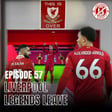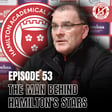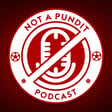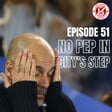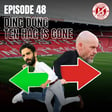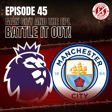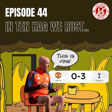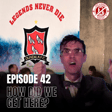Become a Creator today!Start creating today - Share your story with the world!
Start for free
00:00:00
00:00:01

Game Changers: Charlie Pomroy's role in growing Cambodian football with Angkor City
Join us this week as we unravel Charlie Pomroy’s journey in the world of football management, exploring the challenges and triumphs he's faced while steering Angkor City FC in the competitive landscape of Cambodian football.
From the early days of forming the team to navigating the intricacies of managing a club in a unique footballing environment, Charlie shares his experiences, strategies, and the passion that drives him to elevate the sport in Cambodia.
Transcript
Introduction and Guest Overview
00:00:00
Speaker
I'm not into podcasts. Back of the net.
00:00:14
Speaker
Hello and welcome to the Nara Pundit podcast. I'm Kilian Ginnity and I am delighted you are joining us today. Now, if you've listened to the podcast before, you know that I'm an absolute football manager. No, I live out my dreams on that game. And I'm delighted today to have a man with me who's actually living that dream in real life.
00:00:36
Speaker
It is the one and only Charlie Pomeroy. Now, how I came across Charlie was through the sweeper podcast recently where they talked about the Nauru national team. And we will get to that very, very, very shortly because it's a fascinating story.
Charlie's Journey to Cambodia
00:00:50
Speaker
But Charlie, how are you doing? How did you end up in Cambodia? Well, first and foremost, welcome. Thanks for having me. I'm delighted to be here. I mean, yes, Cambodia was
00:01:06
Speaker
It's an unusual choice for most. I think 12 years ago when I arrived, it was almost unheard of. But it kind of happened by accident, but it was a happy accident. I left the UK back in 2010. It was a one-way ticket to India and my coaching licenses in my back pocket and a little bit of cash in my wallet. And it was just really just to get out there and see where the world could take me and where the world of football would lead me.
00:01:36
Speaker
And yeah, it landed in Cambodia. Originally, it was to do a job working with not-for-profit organizations. And the idea was just to bring them all together through football. And that's developed into an academy, which was then very, very successful quickly. And that developed into a professional team.
00:02:04
Speaker
but we'll use that term loosely because I don't think we've quite managed to make that transition just yet.
00:02:10
Speaker
So it kind of started off as the NGO and then ended up as the academy. Academies in that kind of sense isn't unusual worldwide. We see it in places like Qatar with Aspire and in the Philippines would say like the Azkals. Was this like a new thing to Cambodia or had this kind of thing been attempted before?
00:02:40
Speaker
Yeah, I mean, relatively new. I think back when we started, it was only really the capital city, Phnom Penh, that had any teams. So all the professional football in the country was based in the capital or provinces surrounding the capital. Like you'd have like, for example, like Watford to London, you know, our Watford to London club, you know, some would argue yes, some would argue no, you know. So similar to that. So, but Siem Reap, where we are, there was no professional club.
00:03:10
Speaker
but an abundance of talent that I felt deserved that opportunity, not just in Cambodia, but the idea for me was like, I genuinely believe that the young players that we had could go elsewhere and fulfill, you know, some football dreams. So yeah, I mean, it was a relatively new idea to Cambodia, I suppose.
00:03:34
Speaker
But again, for me, I didn't set out to set out an academy.
Transition to Professional Football
00:03:39
Speaker
It kind of just was...
00:03:41
Speaker
a community program where we had some great players from one school, another few from another, these two over here, this goalkeeper over here, and we were like, oh, if we put them all together, what a team we would have. And then we just decided one day that we'd go and enter a tournament, which we won. And then from there, it was like, right, we need to just keep working with this group of boys. Like, let's work with them every single day. And from that, it blossomed into girls teams, and then youth teams, or even younger teams.
00:04:11
Speaker
it just accidentally became an academy, to that sense. I mean, every step of the way, I mean, we're paying the price for it now, I would suppose, but every step of the way, it's kind of just been a happy accident. It's just been the natural involvement of what we're doing.
00:04:31
Speaker
Um, we never, I never set out a community program for 18 months. And then in three years' time, we've developed an academy, which will start graduating students to professional level. And then in 10 years' time, we'll have enough players that are graduated and ready to play. It was never anything like that. Um, and as I mentioned that we're paying that price now because the jump from, you know, development to professional is so big and
00:05:00
Speaker
It was a happy accident that we were offered the opportunity. But, you know, if I could live that moment again, I would be like, hey, we're not ready. Give us a year, you know. And how did that come about? So Cambodia, Cambodia, after COVID, Cambodia reopened its league and they had a new company that was coming in.
00:05:29
Speaker
Especially prior to the Southeast Asia Games, what they wanted was football to be the most popular sport, but one that they could showcase to the rest of Asia that was developing in the country. So they bought a new marketing company called the CPL and they would run the league. And they created, they wanted two divisions. Before it was one big division of 14 teams and they wanted two.
00:05:59
Speaker
We were just a provincial side at the time, winning, you know, our under 18 team was winning the provincial cup every year. And they just had an extra spot. And there was, it was going to be between us and another provincial team. But then I'm not quite sure what happened. But on the day of the league draw, we were expecting it would be, you know,
00:06:23
Speaker
Banti Manjai as the other teams did, Banti Manjai and Next Step, which these two wanted to do a good one, but we were the first name out of the hat. It was just a massive shot, I was like, wow. And they put us both in, so I'm not quite sure who dropped out or who said no, but it ended up that we had the opportunity to play first name out of the hat.
00:06:46
Speaker
But again, it was three weeks before the season. The transfer window had shut. We had no money, no staff, and no players signed. And we had to get ready to compete in our first ever professional game. So it was back against the wall, and everybody working as hard as they could. And very famously, won that first game, to be fair.
00:07:13
Speaker
Brilliant. We won the first game 1-0 against the defending champions of the league. Probably even better. But again, I probably, probably arrogantly and yeah, stupidly rested on that for a little while. I just thought for myself, we won that opening game. I thought, right, here we go. Sponsors, investors, they'll just come, they'll come knocking at my door now.
Challenges of Club Management
00:07:40
Speaker
and you know we didn't and they didn't and i didn't really think too much of it because i thought we were just going to go out and stroll it but that's the mistake i'll never make again but next step has now has evolved into anchor city and was that kind of more about giving yourselves a location by which to like
00:08:04
Speaker
claim or was it more just the next step from moving from the more academy style to being a league team? Yeah, pretty much that. I mean, next step as it sounds, it sounds like an NGO, right? It sounds like a not-for-profit, happy, lovely little place where people come and decide they want to be football players or the coaches and we're going to help them do that. And it's all lovely people helping lovely people. And, you know, and it's wonderful. You know, it was a big part, but
00:08:29
Speaker
What we can't ignore is that football, professional football is a business. Whichever country you're in, it's a business and it needs to generate money and the type of investment that is needed, and don't get me wrong, it's massively, it's nowhere near what's needed in the UK or Europe or anywhere else, but still for the region, the amount of money needed is people want to see a return on that.
00:08:56
Speaker
or they want to, and Nextet just had this, it just didn't have that right energy about it. And we wanted to sort of, because we'd struggled so much in that first year, we really did want to change the image and try to give ourselves a clean start and give that image a clean start. And again, it's kind of,
00:09:24
Speaker
away from us a little bit but again you know we're learning every day we're making mistakes every day but we're learning and that's pretty much the only thing you can do when you're making mistakes. Oh absolutely and speaking of image I highly recommend anybody listening to head to the Anchor City Facebook page where there's a new kit after being posted and it is absolutely lovely I will be ordering that on the home kit very very soon it is available worldwide at a very very reasonable price so
00:09:53
Speaker
Check it out there, Anchor City FC on Facebook and across social. Just a little plug for you there, Charlie. So how does football in Cambodia work? You said it's a new company taking it over with split divisions, promotion, relegation, all the good stuff that we like to see.
00:10:14
Speaker
other than I think maybe a kasuki honda joining the last couple of years I don't think football and Cambodia has really gone hand in hand for the western world really that nobody would have been really paying attention but I just had a quick look that it was based on the soviet model where it's very much kind of like the police has a team maybe the army has a team like so are you basically up against like government funded entities now or is it a data into private?
00:10:42
Speaker
A little bit of both. So we do have, this was a big problem in the transition this year because they've bought in the club licensing laws. So they have their own kind of national club license and what they've said is everybody has to be a commercially run entity. And that's obviously the army and the police. Those teams have kicked up the fasten, you know, EDC, the electrical company. I mean, they won division two last year.
00:11:09
Speaker
But they're now not here, they're gone. You know, because it's really government funded and the owner of that club just sort of said, hey, I was alright putting in some money if, you know, we were also getting backed by the government. But if we're not, then no chance. I don't like people that much. So yeah, I mean, it was that before, but now essentially, every, I mean, every club is owned by a multimillionaire here, you know, and
00:11:39
Speaker
You know, although we're not allowed to say it and well, no one's supposed to know, but we all know it's a secret that everybody knows. And everybody talks about what we're not supposed to is, you know, there are, there are owners who have two companies that own two clubs, but they don't do anything together. They're not the same club. Of course they're not. A bit like in Formula One where it is like, Oh, they're not connected, but they use the same engine. They're not going to help each other out. Of course they're not.
00:12:07
Speaker
You know all the best players from one team going there and playing it's injured he moves to the other one but yeah, so obviously There is there is those politics that you have to kind of just stomach and Yeah, I mean that's hard I mean the whole the whole point the whole reason for me really is
Motivations and Ownership Models
00:12:30
Speaker
Jumping at the chance, like I said, naively to take this club professional was because I had coached another professional club here. And the way that I had been released from that job, shall we say, stung. And I knew it wasn't because of football reasons. I knew it was because someone within the club didn't like the way I operated.
00:12:55
Speaker
And I had hurt his feelings and that was it. And that was the way I lost my job. And I kind of, they did sting at the time and I was kind of eager to jump, get back in as quickly as possible. And that was part of the reason we jumped as early as we did here. But yeah, sort of to track back,
00:13:22
Speaker
multi-millionaire owners, most of whom aren't expecting a return on their investment. This is a hobby, something like that for them. So we're putting that kind of awkward space in between because one, we don't want to be owned by a millionaire who can dictate someone's career at the click of a finger or in a bad mood.
00:13:49
Speaker
However, we do need investors in investment and Cambodian football in our division just doesn't have enough pool. So we're kind of relying on friends of friends or someone that's got
00:14:10
Speaker
We have to kind of push that NGO feel again, you know, like, you know, that we've got young players here, we're trying to develop them, you know, if you pay their salary for a season, it's gonna cost, you know, it's like $1,000 for their salary for a whole season or something like that. So we're having to pull that horrible string of, this is still a charity, whilst trying to portray that image as a professional club. And it, again, it kind of comes across sometimes in the way that we operate, you know, like,
00:14:40
Speaker
Yeah, that's, that's kind of where we are. We're always kind of pushing and pulling.
00:14:48
Speaker
between the two. Which kind of seems to be a universally felt problem across football because I know in the UK there's a team that I pay a subscription to called AFC Crew and their whole thing is trying to change how football in the UK is done. So you pay a subscription every month and you become a board member and it's very much like
00:15:12
Speaker
It's a new form of fan ownership. It's basically all-around off Discord. Would that be or that type of a model be something you could ever explore? Yeah, listen, we looked down that road and it's something I definitely want to do. So we were about to launch it at the beginning of last year.
00:15:33
Speaker
Um, but I was, I had this whole model planned and I was told just to hold because the idea is a good one. It's a great one and it will work, especially in a sort of developing country. And our story is a fantastic one. Like, you know, from where we've come from and the connection that we have with and the things that we've achieved against all odds, people want to jump on our story. So they said, look, if you release it the way that it is now, it's gonna,
00:16:00
Speaker
sync very quickly. And it would just be an idea that was a good one that was executed poorly. We need to execute it better. And that's when we saw a board in marketing teams and marketing advisors said, right, how can we do that? And the first thing they said was you need to change the name. And that's how that's how we hold there. And then since then, it's kind of like it's one of those ideas that's in the back pocket. And we will launch it. But fan ownership and
00:16:30
Speaker
Like I said, the whole idea being we want to be a community run organization where, you know, we look, we've toyed with the idea, for example, you know, auctioning
00:16:44
Speaker
auctioning one of the spots in our team, you know, to a fan and things like this. Or, you know, maybe if fans vote on Man of the Match each week and that player gets X amount of dollars or whatever, you know, or you vote and you put in five dollars or whatever and you get split. And all these different ideas where we can just interact with fans because what we want to do is give the game back to the fans, right? It's horribly
00:17:10
Speaker
obvious to the world that it's, it's corporately run, you know, you can, you're seeing, you're seeing fine examples of it now in terms of, you know, the money that's coming out of the Middle East. And, you know, you can see that you're a friend, everybody's scared to say anything bad, like you can't say anything bad, because we know it's coming. And that's a, it is a, it is kind of,
00:17:36
Speaker
a stain on the game that we love, right? And we all want to, I mean, I like in Cambodian football a lot to kind of non-league football in England. It's probably around that level where, you know, there's good quality.
00:17:53
Speaker
but the money's just not quite there and it's hard to treat them professionally or them to behave professionally when they're not paid professionally. Most of our players study and do extra studies and most others have got part-time jobs elsewhere. So it's all, it's very much like non-league in England and we have to find creative ways to survive because
00:18:23
Speaker
you know, at this point, if we were to not survive or not to finish the season, everything would have been for nothing, you know, and that's heartbreaking.
00:18:34
Speaker
Yeah, I know I personally kind of keep an eye on the Filipino Football League and you're speaking of survival there. One of the things that in like the last year that they struggled with is actually keeping clubs. So I think two or three out of ten didn't finish the year, maybe two of them didn't finish and one did and it's now gone.
00:18:57
Speaker
Is that something that you've seen in Cambodia where it may be hard for people to kind of keep an investment in a certain team because they don't know how long the team is actually going to be there for or have teams kind of gotten to a stage now where they have a bit of a little bit of a tradition going and people start to turn up and kind of are willing to put their their heart into it? I mean we lost 18 in the offseason.
00:19:24
Speaker
Now that's unprecedented. Like, I cannot name or see any other country in the world that loses eight teams. It was madness. You know, I think it was, I mean, the Sweeper Podcast, so there's a company called Young Pioneer Tours, who you probably know, Gareth, who is on the board of Nauru. So he wrote an article about it. And, you know, it was talking about CPL and how they come in.
00:19:54
Speaker
And before CFL had come in, we had 22 clubs. Now we have 16. And apparently football was growing. Like it made no sense to anybody. What they've done is actually the, sorry, the image of the game has grown and the popularity of the game has grown. The quality on the pitch is getting better, but essentially we lost eight clubs in the off season.
00:20:24
Speaker
It's madness. And we survived that. That's the biggest miracle we've always had. There was an off season of nine months. Imagine that as well. Nine month gap between seasons. And we managed to stay the course and clear our debt from last year and progress. And we were ready to start the season and then the season got delayed again and again and again. And then our investors got
00:20:51
Speaker
pissed off and ran and we ended up starting the season again pretty much where we started last season with no money but we didn't have any debt which was nice and it was just kind of like right but we had to stand in front of the players and say look once again we can't quite afford to pay you you know we're going to try and get money we can try and pay on a pay as you play basis but
00:21:15
Speaker
The club has to come first and the little support that we get from the Federation and things like this has to go into us putting on games and that's the harsh reality.
00:21:30
Speaker
And like you've mentioned it there, not just not being able to pay players on a consistent basis, but the fact that like user professional kind of it seems in name only as an owner, that must be frustrating, but even more so as a manager, when you're trying to work with these guys and get these guys to like give themselves to your ideas and stick with you. You could not have hit that on the nail. Like this is what I've been saying.
00:21:52
Speaker
because we're getting pumped at the moment quite a lot. Last week it was three games, 14-0, 7-0, 14-0. Now on the surface, it's like, wow, that's horrendous. This coach must be terrible. Those players must be terrible. But the circumstances around that, it's madness. On the Friday last week,
00:22:18
Speaker
I told the players that we weren't playing the game on the Saturday because we had 11 players and one staff member. No money, no money. And we have to get across the country. Like there was no way we could do it. But at 2 AM on the day of the game, we were told we had to play that game. Not playing the game would mean a $2,000 fine and banned for two years. Jesus.
00:22:48
Speaker
You can find me what you want. I can't afford the bus for $600, let alone your $2,000 fine. Do what you want. But it's the ban for two years that you're like, it's madness. So we legally, I remember we put the AFC law in front of them and said, look, in extreme circumstances such as this, you are allowed to overturn the 48 hour deadline rule.
00:23:17
Speaker
but they just didn't do it. And listen, I don't blame them. It's a ridiculously difficult thing to run elite, especially in a developing country. And for the most part, they have supported us so much. We've missed certain deadlines and paperwork and things like this. Sometimes it's wrong or the wrong language or whatever. So they have been superb with us and very, very patient.
00:23:44
Speaker
But it's those moments where we had to release a statement after the game, then we got punished for releasing the statement because it made them look bad. I said, well, you're making us play with 11 players and one coach. What does that make us look like? It has to be fair. We're protecting our image and we're trying to explain to our fans, hold on, we do care. We're not idiots. We know what's going on in that pitch. It's not okay.
00:24:13
Speaker
It's not the standard that we want. The players are not, you know, usually these things should galvanize teams. You know what I mean? But with us, they don't. It doesn't like, but that's also largely because the man that's supposed to be galvanizing them and pulling them together is also the man that's failing to pay them, you know, or failing to look after their health or failing to provide the basic things for them to perform.
Team Diversity and Cultural Impact
00:24:43
Speaker
You know, and yeah, again, and then I'll go into the changing room and I, there are times where I forget that I'm the owner and I'll be their coach, but then I'm there when I'll forget the other way round as well and I'll be the owner and I'll be like, how have we spent $2,000 on socks? Why are you cutting up your socks? You know, and then I'm an owner again. So it's difficult to play both parts and, you know, we,
00:25:11
Speaker
We've just actually bought in a new guy, Richard Hargis, who's come in and we're still sort of at the beginning of our relationship and I think things are a little bit... There's more work than he first thought there would be. But he and I are kind of wading through everything now and we're starting to find our feet. But we've just got to get to the end of this year
00:25:41
Speaker
Because what's planned and the potential that we have is incredible. But again, it's too difficult now with eight games to go. We're definitely going to finish bottom unless there's a miracle.
00:25:57
Speaker
Thankfully there's no relegation and there's going to be a revamp of the league in the summer as well and there's a possibility they'll go back to one league and we might get promoted anyway, which is again madness.
00:26:13
Speaker
But even bringing it to just on a football level, I noticed with the team business on Wikipedia, so correct me if I am wrong, but you seem to have a good mix of nationalities, which for a coach must be quite difficult when I think you might have a Japanese player and an American player and maybe a Brazilian player and then the Cambodian players and you yourself are English. It must make for an interesting mix of cultures in the dressing room. I wonder who chooses the playlist.
00:26:43
Speaker
Do you know what, we've actually got a public Spotify playlist and I think I could go and add some songs to it, they wanted to. Because my players won't do it, they're all too shy. I think there was a couple of players that put some Justin Bieber on there once and they just got slowly hammered like, what are you doing?
00:27:01
Speaker
You know, not so cool Justin Bieber, I think some of his first songs when he was a kid, you know, like... A baby and all that. Yeah, he just got hammered for it and now everyone's quite as scared. Up with Zillion boy Bruno, he put some Samba music on there and, you know, again, no one knows what's being said apart from him and he can't sing, so... Yeah, but again, it's...
00:27:26
Speaker
It's another area where, I think, when I was a younger coach and growing up playing, the changing room was a great place to be. And you always, as a kid, even when you came to the manager, whatever, you played with your man, you were like, what would you playlist be like? What are the songs that you'd have playing when you came out of the stadium? You're like, we're sitting right here, right now, that's going to be a great song, you know? I think the music that has that, Man City also, maybe, I think Man City has that song also.
00:27:55
Speaker
I can't remember if that's it, but yeah, things like that. I remember my friend and I, we were talking about once there was a club in Germany that every time they scored a goal, there'd be a punk song that came on. The crowd behind the goal would just be going crazy like a mosh pit. We always dream of these things, but here, none of it has been able to be implemented because you can't escape it, but we tried banning phones from the dressing room before a game.
00:28:25
Speaker
But everyone does their own little workouts on their phones, you know, like do their own stretch routines or whatever. And people have their own playlists, so they just listen to their own music. And it's one of those things where you have to kind of just, I'm always really, really disappointed when I'm in the dressing room before the game, because everyone's just in their own little zone.
00:28:48
Speaker
You know, everybody prepares differently, but back when I was younger, I just wanted it to be like a high energy, come on lad bang bang, like everyone's sort of messing around and getting ready for the game, like, but it's not like that here, you know, it's very, very, in your own head focused, players on Facebook live and things like this and things like that, I want to kill them, but it's the way of the world now, like you have to accept it, you know.
00:29:12
Speaker
And just looking at the broader scale, the Asian Cup is going on at the minute, and it's fantastic. There seems to be great interest despite America not knowing who rivals there on CBS. But it's been some fantastic football. But obviously, Cambodia is not there. Has there been a plan from the top? And I know we mentioned them earlier. When Honda came in as technical director, then he was
00:29:41
Speaker
briefly manager and then he's on the 20 trees, it kind of seemed that like bringing in a bit of star power or trying to bring in a little bit of a next level professionalism, it just doesn't seem to have kind of kicked on from there. So has anything been communicated to you as teams about bringing the national team forward or trying to work towards that with your players? Yes and no. So to backtrack slightly, the appointment of Honda was
00:30:10
Speaker
a marketing piece of genius, development wise disaster. Because he's not a coach. And, you know, it doesn't matter. I don't care what player you are, what level you've played at. Ronaldo doesn't just transfer, just doesn't transition in becoming a great coach.
00:30:33
Speaker
You know, you have to go through the steps of becoming a coach. You have to go through your licenses. You have to make mistakes. You have to, you know, listen to coaches and develop, you know, you can't just be, oh, I've worked under Ferguson, so I'll be like him. That's Ferguson's years and years and years of learning, you know, and man management. And you have to go through those steps. There's no, you can be fast-tracked through it, but there's no, there's no easy way of doing it. And he thought it would be easy.
00:31:03
Speaker
he thought he would just be able to come into Cambodia and the Japanese way is the best way. And we'll turn Cambodia into a mini Japan team. And my argument would be all of Japan ever won. Why are they good? Do you know what I mean? If anything, they are the great, great failures of Asian football. Always in World Cups and do nothing. Korea have got further than they ever have.
00:31:33
Speaker
From that side of things, I really hated it, but it was also, without going into too many details, I overheard conversations he's had, watched a couple of sessions that he's coached, and he's more, he was always more concerned with getting himself in the session than he was coaching the session. He just wanted to keep, he kept going in and trying to show people how it should be done. Now listen, I,
00:31:59
Speaker
I could play at this level. I could play at this level here in Cambodia. I've been tempted to, believe me. And I might go into the last five minutes of a training session if it's a finishing drill, and I'll show the players how to put the ball in the back of the net. And they hate me for it. That's my little five minutes of the ace. I still got it. Yeah, still got it. But listen, if I was going to be a professional football player, I would be a professional football player. I wouldn't good enough, and that's fine.
00:32:29
Speaker
He just cannot let go. He just couldn't let go. It was all about him. And the fact that I don't think he knew anybody's name, apart from maybe the two or three top players in the country. And I mean, that was it. But the marketing was in the build up to the Asia Games, we need football to have a good image. And did he change the image of the game? Did he get people?
00:32:57
Speaker
Excited about it? Of course he did. Of course he did. And he did oversee a couple of very famous victories for us, but that was largely down to the coach that he had with him, which was Felix, who is now the national team coach.
Coaching and National Engagement
00:33:16
Speaker
To give you a perfect example of what I'm saying, because, you know, I do have a, let's say, very
00:33:27
Speaker
negative history with Honda as, as, as a person in Cambodia, like the club that I worked for, he was the owner of. And I, again, so we have a history, but to give you the prime example of what I'm talking about in the national team had gone away for a week to play three games and they'd lost 14 nil, eight nil and two nil or something like this.
00:33:55
Speaker
And the players were right back in Cambodia were getting off the plane, showing the media they're signed Honda shirt and hashtagging job done. And I mean, I was with, I was with another fellow head coach when that was happening. And he was going mad because most of the players were his message in each one of them.
00:34:26
Speaker
And that for me was the perfect representation of what Honda was as a national team coach for Cambodia. To finish that tour, to have given everyone a signed Honda shirt. Man, like, come on. But was football all popular during the games? Amazing. The Southeast Asia Games, Cambodia was on show to the world and did an incredible job.
00:34:56
Speaker
The men's team failed, terribly. But hey ho, everybody was excited about the future. And you know, the new guy Felix, Felix was hired and within a week had sat down for an hour with every single head coach in the country. Wow. Do you know what I mean? Like, and he, he wanted to listen about the challenges of every club. He was asking about players at the club.
00:35:26
Speaker
And he basically made it very, very clear to all of us and us who had finished second bottom in division two that year, he was saying, look, if you have a player that you think I should see, he goes, oh, listen, my door is always open. I don't want you to think because you're a, you're a smaller club out of out of Phnom Penh that we're not going to be paying attention. And he, in that hour, he done more for me in that hour than Honda did in seven years.
New Role in Nauru
00:35:55
Speaker
Yeah.
00:35:56
Speaker
And that shows the level of commitment that this new guy wants to go to. And I mean, listen, he's got a, he's got a ridiculously difficult job because Cambodia can't, Cambodia is, I would say probably developing the same as the others, but the others are starting seven steps ahead.
00:36:19
Speaker
Yeah. You know, so we're trying to catch up with Thailand. So we have to not develop the same Thailand. We have to develop quicker, you know, for having a chance to catch up. And unfortunately it all again comes down to money and there just isn't enough of that in the game here at this moment.
00:36:44
Speaker
but it's a great kind of statement of intent from the national team manager. And maybe that kind of idea might help you and his attitude might kind of inspire you in your own national team role, which is with Nauru, which is how I came to find out about you, which Nauru has no football history. So how has this all come about?
00:37:10
Speaker
Um, well, first of all, actually, where is Nauru for those that don't know? It was just about too far from Australia. So if you imagine Australia, if you look in Australia to the top right on the map, like in the Pacific. So, um, yeah, I mean, it's, I've followed Paul for a long time. You know, he's obviously had his own, um, amazing football journey.
00:37:38
Speaker
He wrote an article about me a couple of years ago for 442 and he's just followed the progress of the football club but I think where we kind of connect is
00:37:54
Speaker
you know, we do like obscure football, you know, and things like this. And, you know, I know Gareth, who is one of who's on the board of the football club as well. He's good friends with Paul. And, you know, they he they did work together on the Micronesia before, football before. And Nauru is something that's been in the pipeline for about a year.
00:38:22
Speaker
And then originally, I think they asked if I would be interested in being on the board and being part of the football association of Nauru. And I said, yeah, of course, you know, like any opportunity to sort of work with this group of people and to have kind of another weird thing on your resume. You know, an obscure football thing on my resume was too good to turn down. And then I think it was about a week before the announcement
00:38:52
Speaker
They sort of said to me, look, this is gonna be announced. It's gonna move pretty quickly. Do you fancy being the head coach, you know?
00:39:02
Speaker
You know, we do have like, obviously, there's been talent, you know, there is an ex Premier League player that's also attached to the project. And, you know, I think for the most part, he will be the face, he will be the face of the project. But yeah, you know, it would be a case, it's a case of sort of working alongside him and, you know,
00:39:24
Speaker
doing this interesting thing of, you know, giving this nation its first ever football experience. So for me, too good of an opportunity to turn down. And we always with very bated breath to find out who the Premier League football is. Do you have any plans to visit the island yet or are you waiting for the first game or is there any kind of conversation about that? I mean, plans are
00:39:54
Speaker
Plans are, there's a loose structure at this moment. Obviously, there's a couple of things that need to be organized first, namely being kind of when we can announce the X Premier League player and I mean, a lot of things will work around that schedule as well. I obviously will still be in Cambodia and I have my commitments here. So,
00:40:21
Speaker
For that part, we have a rough guideline of what's going to happen and when we want it to, but always subject to change. But yeah, of course I want to go to visit. We've begun doing some research and I've got a couple of fellow head coaches in the region that are
00:40:40
Speaker
We're having sort of weekly Zoom meetings at the moment because the idea being what we know so far is that the AFL is popular, Aussie rules football is popular on the island and they've beaten the UK and they've beaten Australia and they've beaten the USA in Aussie rules games.
00:40:57
Speaker
So from that we can kind of guess that there is big physicality on the island. So, you know, how do we introduce football to this country? Do we go tactical? Of course not. We're going to have to sort of build around the basics of the foundations of we're a big, physical, strong team.
00:41:17
Speaker
and build from there kind of thing. But yeah, obviously... Just to be very selfish and push my nationality on the world, might I suggest Gaelic football as it has a nice in-between, because we've had a lot of crossover between Gaelic football and Aussie rules, but at least we have the right shape of ball. You'd be pleased to know Gaelic football is massively popular in Cambodia. Fantastic. Massively popular. I do believe
00:41:47
Speaker
There is an organisation that are trying to bring a Cambodian team to Ireland to play. I love that, that's fantastic. If I can find the link I'll send it because I can't remember the name escapes me off the top of my head but I do know that, especially in the capital, it's massively popular.
00:42:08
Speaker
incredible i love that like this this this is one of my favorite things about sport in general but i think soccer is particularly good at is it's just it's the world level leveler kind of brings everybody together for the most random of reasons and like it's one that one of the things i love about your story is the fact that like you started off in the uk and did your own little thing travel to cambodia saw an opportunity to make a difference and have you've done it not only just for in a footballing sense but
00:42:36
Speaker
each of these players are a person and their lives is being affected by this. And I just think it's wonderful. And now it was just another step of that, bringing football and interest to somewhere that just hasn't had the opportunity yet. It's just
00:42:54
Speaker
Yeah, it's very inspirational to somebody like me where, as I say, playing football manager in my bedroom can never compare, but it's getting to see somebody live that dream is just wonderful. Yeah, I mean, I appreciate that. And, you know, I appreciate people like yourself that want to bring these stories to the world because there are, it's not just me, there are thousands like me that are doing similar things and, you know,
00:43:19
Speaker
Again, it's everybody's love for this game that should be the driving force. Too often, in my own experience in football, everyone's trying to one-up on each other. Everyone is too competitive here and there. I don't see the football world like that. I see the football world filled with good people that love this beautiful game.
00:43:43
Speaker
At the end of the day, the result on the field is the least important thing when it brings so many people together to experience the same thing, you know, and have that shared joyful experience.
00:43:57
Speaker
I get goosebumps thinking about it. My wife is always complaining. She's like, why are you so emotional about it? It's my religion. For me, this is the only way I can describe it to her. The way that she feels about Buddha and her religion is the way that I feel about this game.
00:44:17
Speaker
Brilliant. Well, Coach Charlie Pomeroy, thank you so much for joining me. And if you want to follow Charlie, he's on Twitter, Coach Pomeroy. There's Anger City across the board, especially Facebook, I think is where you kind of have the main big following. And then Nauru also just have their first Twitter page as of this week. So look them up and I'll be tagging them all in the social posts. And don't forget, buy your jerseys, check out Anger City
00:44:47
Speaker
Facebook for the games and we'll chat to you next week. Thank you so much. Have a great day. And that was Charlie Pomeroy, our first guest Connor. What did you make of the coach in Cambodia?
00:45:05
Speaker
I mean, it's all downhill from here Killian. I mean, that's one of the most interesting stories I think I've heard ever really, um, you know, from a kid kicking a ball in pear tree park in Stevenage, you wouldn't even think you'd live in Cambodia, let alone be a football coach there, a club owner there. I mean, he.
00:45:25
Speaker
bouncing on to a national coach and, and fostering an academy. Like, I mean, the thing, the work he's doing out there is phenomenal. And I think for a football manager, Stan, like yourself, it's, it's a dream come true. Oh, like I'm, I'm already going to be making a football manager career, managing anchor
Charlie's Impact and Future Plans
00:45:43
Speaker
city. Now I want to get them to the
00:45:44
Speaker
to the top of the Asian champions league and, uh, maybe do it like a nation building with the Cambodian team as well. You know, just make, make Cambodia the new, uh, football manager, um, kings of the world. Um, but I have to say it was, it was fascinating to kind of get a peek behind the curtain on the reality of running a club and like how fraught it can be and how close to the line.
00:46:09
Speaker
Yeah, like I mean, when you hear him talking about, you know, not being able to afford the bus to, you know, the other side of the country for a game, and I suppose even taking out the immediate financial struggles like that, even just the level of admin to keep it alive day by day, it kind of reminds you of non-league football in the UK. But I think if anything, non-league football in the UK almost seems a bit more of a cakewalk because of the community around football in the UK, not that it
00:46:38
Speaker
Not that football in Cambodia isn't absolutely ginormous, but I think it's a different thing and I think if Charlie was in the same situation with a non-league team, it might be that tad easier because I think you'd have more sponsorship opportunities available to you. I think you'd have slightly more football association possibilities there. When he's talking about that
00:47:04
Speaker
one or that the kind of grant from the association only covers one of their games a year like what what he meant to do you know i think it like with my interest in the filipino football league it's kind of a similar situation where you're not just trying to get people interested in it you're actually trying to like go against the wave of the popular sport like there's not that inbuilt um fascination that like you'd see in england or even here like
00:47:33
Speaker
soccer is not our main sport in Ireland but it's still up there and you're like everybody you know is going to be kicking the ball at some point in some way, shape or form and like other than Honda who Charlie had his opinions on like
00:47:51
Speaker
that was the last time any of us would have been talking about Cambodian football. But from now on, we now have a reason because we have a team to follow is Anchorage City. And yeah, it's fascinating to see how
00:48:07
Speaker
one person kind of like having an idea and kind of taking a chance and going out to somewhere like Cambodia can make such a difference because as he said himself he was lucky to fall in with the right people and get the right people kind of around them and to be able to do what he's doing but like you have to
00:48:28
Speaker
people like him, you kind of have to not think of what's happening today or tomorrow. It's like, where's it going to be 10 years and 15 years and like the legacy that's going to be left behind.
00:48:38
Speaker
which I just think is beyond fascinating. I just can't kind of like give him enough credit for it. Well, you hit the nail on the head there and like, you know, obviously you would have picked up Oppa's vibe kind of being conversating with him, but even just kind of listening back to your interview and I'm like, it's hard not to buy in with guys like that. You know, it's very much like,
00:49:02
Speaker
his passion just comes across in every facet. And like, yes, he's got frustrations that, you know, maybe start killing his love for the game. But you can tell deep down, if he'd have quit left in his pocket, it'd be going to Anchor City FC or, you know, to the team in Nauru or helping out other teams. You know, he, you know, you mentioned the AFC crew model, and I know he's talked about the potential of going down that road.
00:49:29
Speaker
you know with the right kind of launch of that you have so many people falling in behind them because I think you know you could pull on his connections across the world from his football background but you know from UK Ireland I mean I'd buy in and I know 10 other people that would too you know. Oh like I really really hope he does because I'd be sick and I know from kind of being involved at AOC Crew that like it is a
00:49:58
Speaker
It is a game changer for small teams. They're able to pay people, not a lot, but they're able to pay or give more than a team at their level should be able to because they're in a kind of financial way and they're trying to do things clever for the long term. You'd imagine Charlie would do the same.
00:50:21
Speaker
before his head gets any bigger than we can imagine. Is there any questions that you wished we could have got to or that should have been asked?
00:50:32
Speaker
Yeah, for me, you know, I think, you know, from, there's definitely a part two to this for sure. And a three, four and five, I think, you know, Charlie's, he's definitely gonna be a friend of the part for a good time. I think, you know, I'm curious as to his motivations for going kind of out to Cambodia for coaching, you know, and
00:50:53
Speaker
would he ever come back and try it again in the UK game and step away from the coaching side, remain as owner and kind of, not multi-club it, but I think that's of interest to
Cambodian Football Development
00:51:04
Speaker
me. And I think also, would he be open, I think once he started talking about the millionaire managers, or not the millionaire managed, millionaire owners, I started to think, would he, I think,
00:51:18
Speaker
Would he be open to taking in sizable investment, or does he want to have that control, and does he want to build in sort of a rexum-ish story, if you know what I mean?
00:51:30
Speaker
Yeah, it's one of these ones that I don't think even he could give you an answer right now. Although saying that, in the last few days we saw tweets from the club saying that they need to sell shirts. I think at the time it was 20 shirts and 48 hours to keep everything going in the way that it should.
00:51:53
Speaker
As I said, I would in the pod, I've ordered my two shirts, the limited edition one and the home one and I highly recommend that other people, if you can, do. They're lovely looking and I'm very, very excited to get them. But if you are ordering, order a size up because the Asian sizes are a slight bit smaller. So if you're looking for a medium, order an arch. A little bit of advice.
00:52:17
Speaker
They are beautiful kids and we're not even just saying it as a favorite of Charlie they really are cool kids but you know it kills me though you know to see someone who loves the game that much puts everything into it both financially personally professionally and like
00:52:35
Speaker
The fact that clubs are having to put out tweets like that to survive is, you know, and we see it, you know, maybe not to that exact specific level, but across the game, across the world, how many clubs right now are on the brink just going week to week or we look back to COVID.
00:52:50
Speaker
you look back and think, how the hell, you know, during COVID, it could have easily been the same as in in Cambodia, where they lost eight teams at the end of the year, which when he said that, I was absolutely shocked. Like when you see that many teams drop out, the fact that they still have a league going is a credit to people like Charlie and that. And I think also to the likes of Felix, the kind of new national team manager and his his appreciation, I suppose, of all levels of Cambodian football.
00:53:19
Speaker
That was fascinating, especially when you consider, like, let's be very Irish-centric here. We're waiting for the New Ireland manager to come in, like, if whoever he may be and if you want to find out who the manager thinks it should be, go and listen back to an episode where we covered that. But imagine the statement of intent and the goodwill
00:53:41
Speaker
That manager would get if they did what Felix did and went to all the league of iron clubs kind of go and listen if you have somebody that you think is Ready or should be in consideration for the teams. My door is open. Here's my number like
00:53:55
Speaker
Which is like, it's so simple. It's such a simple thing to do. And, you know, there's only benefits for any manager does that in this case, Felix, like, okay, say none of those players from Charlie's team get picked Charlie's bought in on that guy, which means he's going to, you know, his players were buying in that guy and their fans are buying in that guy. And that goes wider and wider and wider. And I think for,
00:54:20
Speaker
If you're in hot water in your job results wise and you're making moves like that, that's cash in the bank. And I don't want that to come out and sound like that's why Felix did it. I absolutely don't think it is. I think he's just a good football man. But in the Ireland example, if you want to curry favour very quickly in this country, lean into the League of Ireland.
00:54:43
Speaker
Yeah, and it's that kind of instilling pathway that can push players on where they don't feel they have to go to a different country to make it, which
00:55:02
Speaker
going back to old stats now, I remember from a few years ago, but at the time, Darryl Murphy was still playing, Shane Long was in the Premier League, and of the Irish players actually playing at the top level, I think five or six of them had actually played in the League of Ireland and were
00:55:26
Speaker
getting all the benefits of it. This would have been under the Martin O'Neill tenure, that those that ended up having longer, stronger careers came from the League of Ireland. Well, it embeds a resilience in you, you know? Yeah. You're playing against men that are playing for their wages, not playing in youth leagues. But it was one of the kind of disappointing aspects of Kenny's reign was the fact that we didn't get to see that. And I think it's an exciting time for Cambodian football.
00:55:56
Speaker
when you have a young coach coming in with that kind of an attitude and you have people as passionate as Coach Pomeroy in your leagues. It's really, really good to see. They have a population of 16 million people.
00:56:16
Speaker
there's no reason why they aren't reaching at least the Asian the Asian Cup at least sometimes because like you have that many people there's going to be a lot of talent and yes there is severe poverty and social and political issues in the country but we've seen football raise people beyond that.
00:56:44
Speaker
you know, in Asia and outside Asia, you know, you know, of course, social economic situations affect a country's sports program. But you know, you look around at the likes of the favelas in Brazil, they've put out some of the best football players the world will ever see. And you know, and you just hope that that can happen for a country like Cambodia. And you know, what a country with a population of 16 million people, there's got to be 22 lads and 22 women in that country that can that can put up a good fight. And you know, it
00:57:14
Speaker
I'm excited to see what they come up with. I had to laugh when he said that Japan were the biggest failures in Asian football. That was interesting. Between that and his absolute admiration of Honda, it definitely was a kind of a coddle of opinion, shall we say.
00:57:37
Speaker
Well i think we as you said we've set the bar high on our first one and i'm excited for our next one and we will be back to our regular normally fantastic podcasts and next week but just because charlie did mention it i do want to put in the name it's Karjor Kaima is the GA club
00:57:58
Speaker
Oh, yeah, by the way, sidebar, I know we're wrapping up there, but that was I was I thought he was making it up. But like, that is absolutely wild.
00:58:09
Speaker
No, I have an article here, it did form into 2017 and it's a combination of two cities, two of the largest cities, Siem Reap and Phonem Pei, I guess. Apologies for butchering any pronunciations. But they have even reached the final of the South Asian Gaelic Games, which is
00:58:29
Speaker
Did you know there's a South Asian Gaelic Games? That's another one to check out. The players are like...
00:58:41
Speaker
are in the minority on the team, like they're mostly Cambodians. And let's face it, they'd be a million miles better than us, so, you know. Well, who knows? And maybe hopefully it'll reach Nauru now via Charlie. But yeah, so it's carriage a climber, check them out online, another one. So if you're not fully invested in soccer, well, at least there's the GAA for you in Cambodia, because that's where it is at.
00:59:09
Speaker
And that is where we are going to leave it. Connor, thanks very much for joining me for this little kind of debrief after the interview. And we'll chat just next week. Bye bye. I'm not into podcasts. Back of the net.



